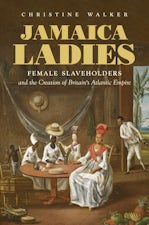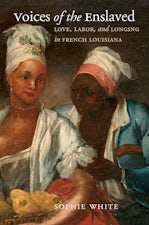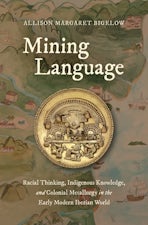Encyclopédie noire
The Making of Moreau de Saint-Méry's Intellectual World
By Sara E. Johnson
392 pp., 6.125 x 9.25, 34 color plates, 37 halftones, 1 table, notes, bibl., index
-
Hardcover ISBN: 978-1-4696-7691-3
Published: November 2023 -
E-book EPUB ISBN: 978-1-4696-7692-0
Published: November 2023
Published by the Omohundro Institute of Early American History and Culture and the University of North Carolina Press
Buy this Book
- Hardcover $45.00
- E-Book $29.99
For Professors:
Free E-Exam Copies
Published by the Omohundro Institute of Early American History and Culture and the University of North Carolina Press
Sara Johnson's arresting investigation of race and knowledge in the revolutionary Atlantic surrounds Moreau with the African-descended people he worked so hard to erase, immersing him in a vibrant community of language innovators, forgers of kinship networks, and world travelers who strove to create their own social and political lives. Built from archival fragments, creative speculation, and audacious intellectual courage, Encyclopédie noire is a communal biography of the women and men who made Moreau’s world.
About the Author
Sara E. Johnson is professor of literature of the Americas at University of California, San Diego.
For more information about Sara E. Johnson, visit
the
Author
Page.
Reviews
"With her spectacular new book Encyclopédie noire: The Making of Moreau de Saint-Méry’s Intellectual World, Sara E. Johnson steps out as one of the most important voices in this field. Her book is groundbreaking in many regards . . . . a remarkable book, a must-read for anyone interested in the eighteenth century, in slavery, in biography, in intellectual history, in archives – or in history-writing in general. For a book that is so profoundly researched and theorized, it is also an outstanding read."—Age of Revolutions
"Encyclopédie noire is an utterly original examination of the work and impact of Moreau—and so much more. Through gorgeous prose and meticulous close readings across a vast array of sources and languages, Johnson marginalizes Moreau to create a 'communal biography' that centers the lived experiences of the women and men he enslaved. Moving across disciplines and methodological boundaries to breathtaking effect, Johnson illuminates how the European Enlightenment and Black Atlantic were inextricable from each other. This book will forever change the way we think about the fields of both literary studies and history. This is the book we have been waiting for."—Jennifer L. Morgan, New York University
"In this fascinating and important book, Sara Johnson transforms our understanding of one of the most influential figures in the eighteenth-century Atlantic world. With deep research and innovative analysis, Johnson reveals that every aspect of Moreau’s career relied upon the stolen labor and—crucially—the stolen knowledge of enslaved and free people of color. Encyclopédie noire transcends biography to offer a profound meditation on the relationship between knowledge and power."--Brett Rushforth, University of Oregon
"With utterly brilliant insight and beautiful prose, Sara Johnson unfolds, and essentially untells, the life of one of the most famous French colonial authors from the eighteenth century. In Johnson’s 'communal' retelling, it was Moreau’s status as an enslaver, with both a 'legitimate' (white) and ‘illegitimate’ (Black) family, that provided him with the luxury, capital, and leisure time to purchase the books and write the stories that have made him a legend in the print culture of the Haitian Revolution."--Marlene L. Daut, Yale University




